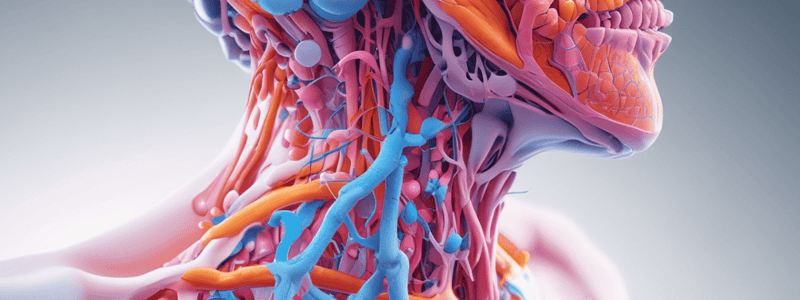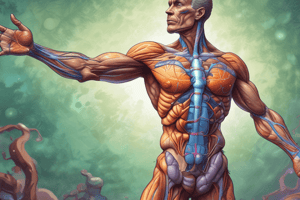Podcast
Questions and Answers
Which type of hormone can easily pass through the phospholipid plasma membrane of target cells?
Which type of hormone can easily pass through the phospholipid plasma membrane of target cells?
- Glycoproteins
- Non-steroids
- Proteins
- Steroids (correct)
Which hormone is an example of a peptide?
Which hormone is an example of a peptide?
- Insulin (correct)
- Estrogen
- Cortisol
- Thyroid stimulating hormone
Which of the following is a function of hormones?
Which of the following is a function of hormones?
- Regulating growth
- Regulating reproduction
- Regulating fluid and electrolyte balance
- All of the above (correct)
Which hormone is an example of a glycoprotein?
Which hormone is an example of a glycoprotein?
Which type of hormone interacts with receptor sites on the cell surface?
Which type of hormone interacts with receptor sites on the cell surface?
Which hormone is an example of an amino acid derivative?
Which hormone is an example of an amino acid derivative?
Which hormone is classified as a protein?
Which hormone is classified as a protein?
What is the main function of the endocrine system?
What is the main function of the endocrine system?
What is the main difference between the nervous system and the endocrine system?
What is the main difference between the nervous system and the endocrine system?
What is the purpose of signal transduction pathways in the endocrine system?
What is the purpose of signal transduction pathways in the endocrine system?
What is the role of hormones in the endocrine system?
What is the role of hormones in the endocrine system?
How do the endocrine and nervous systems work together?
How do the endocrine and nervous systems work together?
How are physiological levels of hormones maintained in the body?
How are physiological levels of hormones maintained in the body?
How are hormones measured in the body?
How are hormones measured in the body?
Which hormone is produced by the pineal gland?
Which hormone is produced by the pineal gland?
Which endocrine gland is located between the lungs?
Which endocrine gland is located between the lungs?
What is the function of the hypothalamus?
What is the function of the hypothalamus?
Which hormone is classified as an iodinated amino acid?
Which hormone is classified as an iodinated amino acid?
Where are the adrenal glands located?
Where are the adrenal glands located?
Which hormone is classified as a glycoprotein?
Which hormone is classified as a glycoprotein?
Which hormone is classified as an amine?
Which hormone is classified as an amine?
Which hormone is responsible for milk production?
Which hormone is responsible for milk production?
What is the primary role of the parathyroid hormone (PTH)?
What is the primary role of the parathyroid hormone (PTH)?
Which part of the adrenal gland is responsible for producing steroid hormones?
Which part of the adrenal gland is responsible for producing steroid hormones?
What is the role of the thymus gland?
What is the role of the thymus gland?
What is the function of the posterior pituitary gland?
What is the function of the posterior pituitary gland?
What is the primary role of insulin and glucagon?
What is the primary role of insulin and glucagon?
Which hormone is responsible for stimulating the ovaries to produce estrogen?
Which hormone is responsible for stimulating the ovaries to produce estrogen?
What is the role of the hypothalamus in the endocrine system?
What is the role of the hypothalamus in the endocrine system?
What is the primary function of the adrenal medulla?
What is the primary function of the adrenal medulla?
Flashcards are hidden until you start studying
Study Notes
Introduction to Endocrinology
- The endocrine system regulates the body's internal environment via endocrine glands, which produce and release hormones.
- Hormones are released into the bloodstream, transported to distant parts of the body, and bind to target cells to elicit effects.
Characteristics of Hormones
- Hormones are chemical messengers that have an effect on target cells distant from the hormone-secreting cells.
- Signal transduction pathways mediate the sensing and processing of external stimuli.
- Steps in signal transduction: a stimulus arrives at an endocrine gland, inducing a secretory cell to release a signaling molecule (hormone), which binds to a receptor on a target cell's plasma membrane, initiating a signaling cascade inside the cell.
Classification of Hormones
- Classified based on composition and where they interact with target cells.
- 2 main types: steroids (cholesterol-derived, lipid-soluble, easily pass through phospholipid plasma membrane of target cells) and non-steroids (protein-derived, water-soluble, interact with receptor sites on the cell surface).
Non-Steroid Hormones
- Proteins: made of long chains of amino acids (e.g., insulin and glucagon).
- Glycoproteins: attached to a carbohydrate group that attaches to an amino acid (e.g., thyroid-stimulating hormone).
- Peptides: short chains of amino acids (e.g., oxytocin).
- Amino acid derivatives: single amino acids (e.g., epinephrine, norepinephrine, melatonin).
Endocrine Glands
- Produce and excrete hormones, working together to achieve a response.
- Locations: brain, neck, lungs, pancreas, kidney, pelvic region.
Hypothalamus and Pituitary Gland
- Hypothalamus: "control center" linking the CNS and endocrine system.
- Senses impulses from the brain and passes them to the pituitary gland.
- Pituitary gland: "master gland" that controls other endocrine glands by activating their release of hormones.
- Divided into two sections: anterior (communicates with hypothalamus via hormone) and posterior (communicates with hypothalamus via neurons).
Thyroid and Parathyroid Glands
- Thyroid gland: produces thyroid hormones (T3 and T4) that regulate metabolism, development, and catecholamine release.
- Parathyroid glands: produce parathyroid hormone (PTH), which maintains calcium homeostasis and opposes calcitonin's activity.
Adrenal Glands
- Located on top of the kidneys.
- Adrenal cortex (shell): produces steroids, including cortisol, which increases blood glucose and suppresses the immune system, and aldosterone, which increases sodium reabsorption in the blood and maintains hydration.
- Adrenal medulla (core): produces neurotransmitters for the sympathetic nervous system, including norepinephrine and epinephrine.
Ovaries and Testes
- Produce sex hormones (estrogen and progesterone in ovaries, testosterone in testes) that regulate reproductive processes.
- FSH stimulates follicle and egg maturation in ovaries, and sperm production in testes.
- LH stimulates ovulation and progesterone production in ovaries, and testosterone production in testes.
Studying That Suits You
Use AI to generate personalized quizzes and flashcards to suit your learning preferences.





